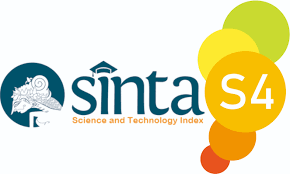Can Social Media, Digital Literacy, and Resilience influence Interest in Digital Entrepreneurship? Study on Students University
DOI:
https://doi.org/10.26740/joaep.v5n2.p84-97Keywords:
Social Media, Digital Literacy, Resilience, Interest in Digital EntrepreneurshipAbstract
The digital era requires young people to be able to adapt to technological developments and emerging business opportunities. This study aims to analyze the influence of social media, digital literacy, and resilience on the interest in digital entrepreneurship among students at Surabaya State University. The research method used an associative quantitative approach with a sample of 225 students selected through proportional stratified random sampling. The research instrument was a Likert scale questionnaire that had been tested for validity and reliability. Data analysis was performed using multiple linear regression. The results showed that social media had a significant negative effect on interest in digital entrepreneurship, digital literacy had a significant positive effect, and resilience has a significant negative effect. Simultaneously, the three variables have a significant effect with a coefficient of determination. The implications of this study emphasize the importance of digital literacy in increasing interest in digital entrepreneurship, as well as the need for productive use of social media and an understanding of the appropriate role of resilience in career decision-making.
Downloads
References
Ajzen, I. (1991). The theory of planned behavior. Organizational Behavior and Human Decision Processes, 50(2), 179-211.
Bano, S., Zeng, J., & Tanveer, M. (2019). Social media overuse and its impact on productivity: A review. Journal of Business and Technology, 14(3), 45-58.
Darmadani, C. A., & Nikmah, C. (2025). The Influence of Entrepreneurship Courses and Entrepreneurship Skills on Students’ Motivation for Entrepreneurship. Journal of Psychology and Culture Behavior in SDGs, 1(3), 45–55.
Faizah, N., Rizki, M., & Wicaksono, A. (2025). Pengaruh penggunaan media sosial terhadap minat berwirausaha mahasiswa. Journal of Digital Entrepreneurship, 2(1), 22-33.
Fahrani, R., Putri, S., & Hartono, D. (2023). The role of resilience in entrepreneurial success. International Journal of Entrepreneurship Studies, 6(4), 112-125.
Ghozali, I. (2018). Aplikasi Analisis Multivariate dengan Program IBM SPSS 25 (Edisi 9). Semarang: Badan Penerbit Universitas Diponegoro.
Hanim, L. F., & Puspasari, D. (2021). Pengaruh Self Efficacy terhadap Minat Melanjutkan Studi S2 pada Mahasiswa Prodi Pendidikan Administrasi Perkantoran. Edukatif: Jurnal Ilmu Pendidikan, 3(4), 1838–1848.
Harisandi, A., Susanti, E., & Hidayat, F. (2023). Media sosial sebagai sarana peningkatan peluang usaha. Jurnal Bisnis dan Manajemen, 11(2), 50-62.
Indraswati, S., et al. (2020). Metode penelitian kuantitatif dan analisis data SPSS. Yogyakarta: Penerbit Andi.
Luthar, S.S., Cicchetti, D., & Becker, B. (2000). The construct of resilience: A critical evaluation and guidelines for future work. Child Development, 71(3), 543-562.
Mahdiani, M. & Ungar, M. (2021). Resilience and entrepreneurship: A complex relationship. Journal of Business Research, 124, 112-123.
Mugiono, W., et al. (2022). Digital literacy and entrepreneurial intention in emerging markets. Asian Journal of Business and Management, 14(1), 56-68.
Nasrullah, M. (2021). Literasi digital dalam bisnis modern. Jurnal Teknologi dan Manajemen, 8(3), 99-110.
Özpolat, A. (2020). Domain-specific resilience: Implications for entrepreneurial behavior. Journal of Psychology and Business, 15(2), 88-101.
Park, N., Kee, K.F., & Valenzuela, S. (2017). Being immersed in social media: The effects on information seeking and entrepreneurial opportunities. Computers in Human Behavior, 68, 299-307.
Puspasari, D., & Muyassaroh, J. (2023). The Effect of Learning Motivation and Discipline on Student Academic Achievement. Scaffolding: Jurnal Pendidikan Islam dan Multikulturalisme, 5(2), 79–89.
Ruswahyuningsih, S. & Afiatin, N. (2015). Resiliensi dan adaptasi pada mahasiswa. Jurnal Psikologi Pendidikan, 10(1), 15-25.
Sangadji, S.F., et al. (2024). Media sosial dan produktivitas: Dampak dan solusi. Jurnal Manajemen Teknologi, 16(1), 45-58.
Shapero, A. & Sokol, L. (1982). The social dimensions of entrepreneurship. In C.A. Kent, D.L. Sexton, & K.H. Vesper (Eds.), Encyclopedia of Entrepreneurship (pp. 72-90). Englewood Cliffs, NJ: Prentice-Hall.
Verduyn, P., et al. (2017). Passive social media use and psychological well-being: A longitudinal study. Journal of Social and Clinical Psychology, 36(2), 116-133.
Wojujutari, O.O., et al. (2024). Personal and digital factors influencing entrepreneurial intention. Journal of Entrepreneurship Research, 9(1), 100-113.
Zhao, H. & Wibowo, A. (2021). Resilience and entrepreneurial propensity: The moderating role of values and experiences. Journal of Business Venturing, 36(4), 105-117.
Downloads
Published
How to Cite
Issue
Section
 Abstract views: 61
,
Abstract views: 61
, PDF Downloads: 44
PDF Downloads: 44










